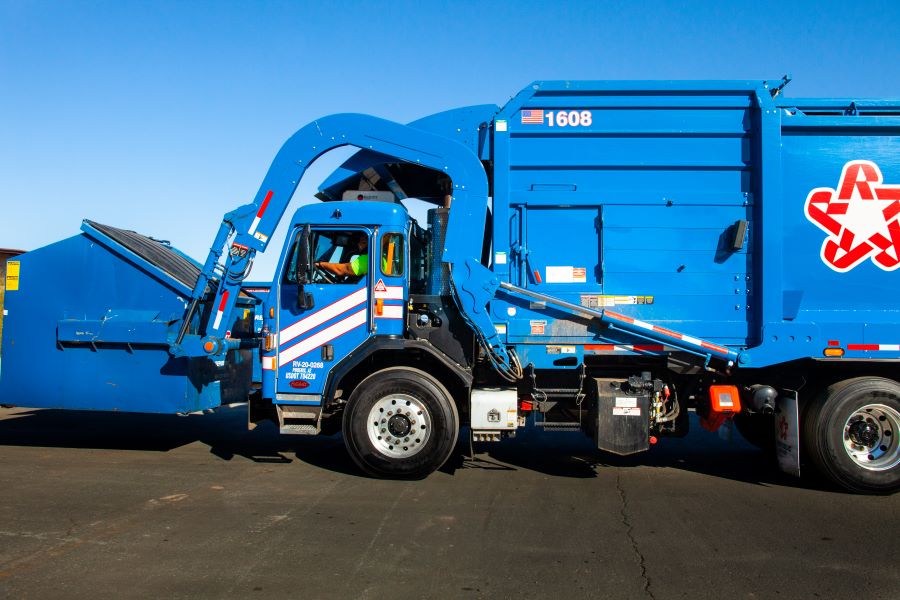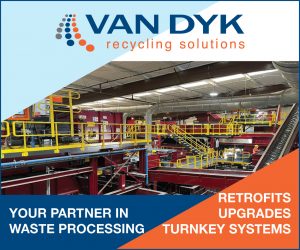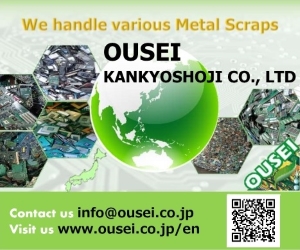
Executives expressed mixed opinions about whether commodity prices would increase or remain flat in 2023. | Courtesy of Republic Services
A late-year crash in commodity prices crippled what would have otherwise been a strong 2022 for some of the largest recyclables sorting and marketing operations in North America.
In recently filed financial disclosures, Republic Services, GFL Environmental, Waste Connections and Casella Waste Systems reported on the pain inflicted on their recycling businesses by the late-2022 decline in recyclables prices, particularly for OCC and mixed paper.
For most, recycling remains a relatively small part of their business, with much more money coming from garbage collection and landfilling. But markets still reduced fourth-quarter recycling revenues by 47%, 17% and 63% for Republic, GFL and Waste Connections, respectively. Casella reported an overall increase, but much of that was tied to acquisitions, and depressed commodity markets held back overall growth.
The latest financial filings mark a reversal from what haulers were saying one year ago, when bale prices were red hot and revenues were soaring.
Looking forward, some of the company executives are expecting commodity prices to increase modestly this year, while others are forecasting they’ll remain relatively flat.
The following are key takeaways from recent fourth-quarter and full-year reports from Republic, GFL, Waste Connections and Casella, which are the second-, third-, fourth- and fifth-largest publicly traded garbage and recycling companies in North America (the largest, Waste Management, released its numbers earlier, on Jan. 31).
Republic Services
Republic’s recycling business tallied $59 million in revenue in the fourth quarter of 2022, down 47% year over year. For the full year, the recycling business’ revenues totaled $359 million, down 15% from the prior year, according to a press release.
During the fourth quarter, the company saw an average commodity price of $88 per ton, down 60% from the fourth quarter of 2021. That $88 was also down from the third quarter of 2022, when the average was $162 per ton.
According to the release, for the full year, Republic averaged a sales price of $170 per ton, down 9% from 2021.
During a Feb. 15 conference call with investors, Brian DelGhiaccio, chief financial officer for Republic, noted that current commodity prices are averaging about $95 per ton.
“We believe that current commodity prices are temporarily depressed due to a global supply/demand imbalance and that prices will recover in the second half of the year,” he said.
Republic is forecasting recyclables will average about $125 per ton in 2023, he said.
In terms of tonnages, Republic Services sorted and sold 2 million tons of recyclables (excluding glass and organics) in 2022, with another 2 million tons collected by Republic trucks and delivered to third-party processors, according to the company’s annual report. Those numbers are slightly down from the prior year, when Republic sold 2.2 million tons (excluding glass and organics) from its MRFs and collected and delivered 2.1 million tons to third parties.
In terms of organics recovery, Republic processed 1 million tons and sold 300,000 tons of organic materials in 2022.
During the Feb. 15 conference call, executives also announced that they’re working to build a second polymer center, this one in the Midwest. The polymer centers will take bales from Republic’s MRF and perform additional sorting, as well as grinding and washing to produce food-grade recycled flakes. The first one, in Las Vegas, is slated to come on-line later this year.
In addition to building new recycling operations, Republic has been acquiring a number of companies. The press release notes that Republic plans to spend roughly $500 million in acquisitions this year. Acquisitions were partly responsible for a large overall jump in company revenue last year. According to the press release, Republic’s total revenue was $3.53 billion in the fourth quarter and $13.50 billion for the full year 2022, up 20% in both cases. For the fourth quarter, acquisitions increased Republic’s revenue by 11%, and for the full year, acquisitions boosted the revenue number by nearly 10%. Republic’s largest purchase last year was for hazardous materials disposal and recycling company US Ecology, which it picked up for $2.20 billion.
GFL Environmental
The Toronto-headquartered company’s recycling business brought in 78 million Canadian dollars and 346 million Canadian dollars (about $57.4 million and $254 million U.S., respectively) in revenue during the fourth quarter and full year 2022, respectively.
The fourth-quarter number was down 17% year over year, and the full-year revenue was down 3% from the prior year, according to a financial results document.
By the numbers
The following is a look at key fourth-quarter and full-year 2022 recycling numbers from four of the largest publicly traded haulers in North America (the largest, Waste Management, released its numbers earlier, on Jan. 31):
Republic Services
- Q4 recycling revenue: $59 million
- Q4 revenue change YoY: Down 47%
- 2022 recycling revenue: $359 million
- 2022 revenue change: Down 15% from 2021
- Q4 average commodity price: (excluding glass and organics): $88 per ton
- Q4 price YoY: Down 60%
- 2022 average commodity price (excluding glass and organics): $170 per ton
- 2022 price change: Down 9%
GFL Environmental
(Note: U.S. dollars below were converted from Canadian on Feb. 24, 2023)
- Q4 recycling revenue: $57 million
- Q4 revenue change YoY: Down 17%
- 2022 recycling revenue: $254 million
- 2022 revenue change: Down 3%
Waste Connections
- Q4 recycling revenue: $26 million
- Q4 revenue change YoY: Down 63%
- 2022 recycling revenue: $205 million
- 2022 revenue change: Flat
- Q4 OCC price average: $56 per ton
- Q4 price YoY: Down 70%
Casella Waste Systems
(Note: The numbers below apply to the company’s Resource Solutions business, which includes more than just recycling):
- Q4 revenue: $71 million
- Q4 revenue change YoY: Up 11%
- 2022 revenue: $300 million
- 2022 revenue change: Up 28%
- 2022 operating income: $16 million
- 2022 income change: Down 10%
- 2022 average commodity price: $125 per ton
The commodity markets held back GFL’s overall revenue growth in the fourth quarter and last year, a press release shows. Material recovery is part of the company’s solid waste business, which includes large garbage collection and landfill operations.
Overall, the solid waste business’ fourth-quarter revenue growth (excluding the impact of acquisitions) was 10.9% year over year. Of that growth, 9.9 percentage points came from higher prices charged to customers, 1.6 percentage points came from surcharges imposed by GFL, and 1.2 percentage points came from the company simply handling larger volumes of material during the quarter. But depressed commodity prices reduced the revenue growth by 1.8 percentage points, resulting in the fourth-quarter revenue increase 10.9%.
Looking forward, GFL expects that lower commodity prices will hold back revenue growth slightly in 2023 as well, according to a company presentation.
“We’ve assumed no improvement in the current levels. And so that represents a material headwind going into 2023,” Luke Pelosi, GFL’s chief financial officer, said during a Feb. 22 conference call with investors.
In terms of facilities, GFL is working to build a new Midwest MRF that’s expected to come on-line during the 2023 fiscal year, and the company is in the planning stages for a new MRF in southern Ontario, the presentation shows.
Material recovery made up about 5% of GFL’s total operating revenue in 2022.
Waste Connections
The company’s recycling business brought in $26 million and $205 million in revenue during the fourth quarter and full-year 2022, down 63% and flat year over year, respectively, according to the company’s annual report and a press release
In the release, the company’s CEO, Worthing Jackman, noted that Waste Connections increased its prices, which helped it boost its revenue and profit margin in 2022, despite “elevated wage, fuel and inflationary pressures, and a 70% drop in recycled commodity values in the second half of the year.”
In a Feb. 16 call with investors, Mary Anne Whitney, Waste Connections’ chief financial officer, noted that revenues from the sale of recovered commodities specifically (not including recycling revenues from fees charged) dropped by 70% in the fourth quarter, compared with the same quarter in 2021. That was due to a decline in pricing that started mid-year and continued through November.
OCC averaged about $56 per ton during the fourth quarter, she said, down 60% from the third quarter. “OCC pricing has been relatively stable since November in the range of $55 to $60 per ton with some recent indications of improvement,” she said.
Looking forward, Waste Connections isn’t formally forecasting any increase in commodity values, although there are signs of rising prices, Whitney said.
“We’re encouraged by the improvement we’re hearing about in February for recycled commodities with prices in some markets reported to already be up more than 10% from recent lows,” she said during the call. “That said, we have not factored any such pickup into our outlook.”
In terms of investments, Jackman noted during the call that Waste Connections recently installed its 50th sorting robot at a MRF. That hasn’t just allowed the company to reduce labor, but it’s also boosted bale quality, allowing Waste Connections to fetch higher prices.
Casella Waste Systems
Casella’s Resource Solutions business, which includes recycling, reported $71 million and $300 million in revenue during the fourth quarter and full-year 2022, respectively. The quarterly number was up 11% year over year, and the full-year number was up 28% from 2021, according to a press release.
The Resource Solutions business includes services for large industrial, institutional or multi-site retail customers; Casella’s organics processing and disposal business; and the company’s recycling business.
It’s important to note that much of the revenue increase was the result of acquiring other companies. In 2022, Casella acquired 14 businesses, mostly solid waste-related ones, for about $83 million.
According to the release, fourth-quarter 2022 Resource Solutions revenue was $6.8 million higher year over year. Of that amount, acquisitions were responsible for an increase of $4.9 million, greater volumes of material handled were responsible for an increase of $4.5 million, and surcharges and other fees were responsible for increasing revenue by $1 million. Partially offsetting those was lower prices, which reduced revenue by $3.5 million.
For the full year of 2022, Resource Solutions’ revenue was up by $65 million. Of that amount, $43 million of the increase came from acquisitions and $26 million came from higher volumes of material handled. On the other hand, lower commodity prices and lower processing volumes reduced revenues by $4 million, according to the company’s annual report.
Casella’s annual report also shows the profitability of its different businesses, including Resource Solutions. In 2022, Resource Solutions had an operating income of $16 million, down 10% from the year prior.
In a Feb. 17 conference call with investors, John W. Casella, the company’s CEO, said that in the fourth quarter the company experienced sharper pain from commodities prices than expected.
“This was mainly driven by several recycling contracts that we have acquired through acquisitions over the last couple of years, which do not yet have our modern risk mitigation features,” he said. “Over time, as these contracts reset, we intend to incorporate these mechanisms.”
In the call, Jason Mead, senior vice president of finance for Casella, said recovered commodities averaged $125 per ton last year, ending the year at $59 a ton in December. They’re averaging $64 a ton today, and Casella is forecasting the average will rise to $78 through the year.
During the call, John Casella also touched on the company’s MRF equipment upgrades. The most significant upgrade is at Casella’s Boston MRF, which is one of the largest in the country. The company is investing $20 million upgrading the plant, which will be offline for several months before the project is complete around mid-year, he said.
That’s not the only MRF seeing improvements, however. In 2022, Casella installed robots and optical sorters at several MRFs, including a robot in Rutland, Vt., where Casella is headquartered.
In terms of tonnages, Casella Waste Systems processed and/or marketed 800,000 tons of recyclables in 2022.



